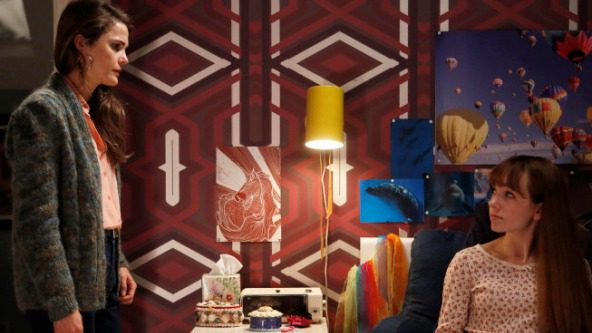What is home? Is it where you live, or where all your stuff is? Is it “where the heart is” or “wherever you hang your hat”? To me, the best definition of “home” comes from a children’s book, Daniel Pinkwater’s The Big Orange Splot: “My house is me and I am it. My house is where I like to be, and it looks like all my dreams” (yes, I know Pinkwater says “house” instead of “home,” but you get my point). The Americans has never been a show to shy away from big questions, and “The Deal” is no exception. Look at Phillip and Elizabeth, for instance: 5,000 miles away from where they were born, in a country they don’t consider home – but can they consider Russia “home” anymore? Will they ever return there?
A lot of these questions arise during Phillip’s time spent babysitting the Mossad agent he and Elizabeth abscond with after the botched kidnapping of Anton Baklanov. The conversation is largely one-sided, as Phillip doesn’t seem too interested in conversing. These scenes have echoes of Walter White’s basement conversations with Krazy 8 in Breaking Bad. They develop a mutual if begruding respect for each other, even if the agent gets on Phillip’s nerves by asking him questions like “Is your name your name? Is your face your face? Are your children your children?”
When Phillip makes the trade – the Mossad agent for Baklanov – Baklanov breaks down in tears in the car. “Don’t send me back there,” he begs. When that doesn’t work, he lashes out at Phillip: “You’re a monster! You’re not a man. Whatever you once were, they trained it out of you. No feeling, no humanity. You may as well be dead.” Phillip says nothing, but Rhys’ stoic eyes show that in his heart, he knows all of this to be true. It’s hard to think of Phillip as the bad guy in this scene, even though objectively he is. But it’s almost as though he doesn’t have a choice. Look at this posture behind the wheel: world-weary and slumped. His voice when he speaks to the Mossad agent is resigned and almost mournful. He doesn’t have a choice. He’s doing it for his home.
Lastly, look at the last scene of “The Deal.” Phillip comes home, exhausted. He lies down on the couch with Elizabeth, and within moments their children’s alarm clock are ringing. “Mom? Dad?” Paige calls, but receives no answer. Her mom and dad aren’t there.
Are your children your children if your home isn’t your home?
A Few Thoughts
– I know this review was brief, but every so often this goddamn show sends down an existential rabbit hole
– Elizabeth goes undercover as Clark’s sister Jennifer, so she and Martha can have girl time. She gets Martha to forgo putting Clark’s name down as her husband (good), but then has to hear about his prowess in the sack (more than a little uncomfortable)
– Elizabeth also has a tender scene with Brad Mullen, the seaman recruit she tasked with getting her the files on Emmet and Leanne’s possible killer. She seems to genuinely like him, and the heartbreak is evident in Keri Russell’s voice and eyes when she tells him “I don’t have anything for you. I wish I did.”
– The simmering conflict between Oleg Igorevich and Arkady Ivanovich is about to boil over. I was surprised by Oleg’s power play; he’s a savvier operator than I gave him credit for at first
– While on the subject of the Rezidentura: I admire the hell out of The Americans for subtitling all scenes that take place there. Most shows would just have their Russian characters speak like Boris and Natasha
– Dan Attias, who directed “The Deal,” also directed the It’s Always Sunny in Philadelphia episode “Charlie Goes America All Over Everybody’s Ass.” I just thought that was a funny coincidence

